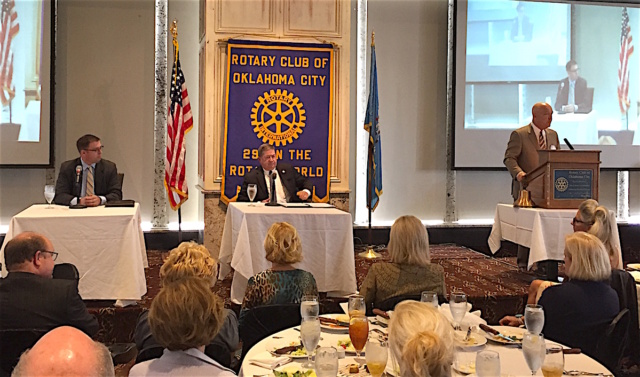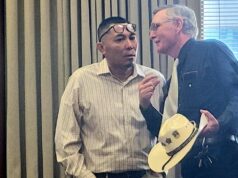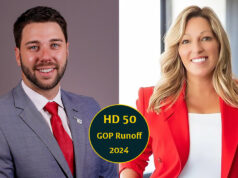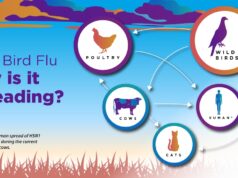

As Rep. Scott Biggs (R-Chickasha) and former Oklahoma Attorney General Drew Edmondson debated State Question 777 Tuesday in front of the world’s largest Rotary club, former Gov. David Walters spun a hefty softball at the two former prosecutors: “Is there any chance if we pass 777 that we can return back to our beloved sport of cockfighting?”
Walters’ quip brought guffaws and applause from the 200-plus Rotarians gathered for their weekly meeting, but despite the humor in its delivery, the question stands relevant to the proposed constitutional amendment.
“Every law on the books Dec. 31, 2014, would stay in place,” said Biggs, a former assistant district attorney in Grady, McIntosh and Caddo counties who owns a farm and equine operation. “Cockfighting is banned in the state of Oklahoma and it stays banned, even with this, despite what you read on Facebook.”
Edmondson countered.
“Well, the Oklahoma Gamefowl Association — which is a euphemism for cockfighters — is supporting the passage of 777, so they see a window of opportunity,” the former Muskogee County District Attorney and longtime AG said. “And the fact of the matter is, all the Legislature has to do is reduce the penalty of $25. They don’t have to repeal the ban on cockfighting.”
He continued, nodding back at Walters, who served as governor for the four years prior to Edmondson’s first swearing in as attorney general.
“If you’ll recall, and I’m sure you do, we couldn’t get the Legislature to introduce the legislation to ban cockfighting. It took a lot of work by the people to circulate petitions to get that on the ballot,” Edmondson said. “So it’s not beyond the realm of possibilities that this Legislature could be very sympathetic to allowing cockfighting to exist in the near future.”
‘The devil is in the details’
State Question 777 will be on November’s ballot, and it asks voters to decide whether to approve a constitutional amendment that prevents the Legislature from passing any regulation or restriction of agriculture unless it meets a “compelling state interest,” a phrase that Edmondson said Tuesday is “the highest burden of any civil litigation.”
While many groups fear SQ 777 will impede future regulation of matters like water, pesticides, herbicides and animal cruelty, those same opponents argue it would also make it easy for special interest groups to repeal statutes — such as cockfighting prohibition — with the knowledge that future legislatures could never re-implement them.
The Oklahoma Farm Bureau and other large agriculture-related organizations argue that SQ 777 is needed as “an extra protection” against animal rights’ organizations that want to pass “feel-good” laws, as Biggs described them Tuesday.
“This is a proactive measure that stops legislation that is not based on sound science,” Biggs said. “This is not a blank check for agriculture. This is not a blank check for corporate ag.”
Edmondson disagreed, calling SQ 777 “a solution looking for a problem,” a common phrase bandied about in the Legislature during debate on bills. Biggs authored the measure that called for SQ 777 to be voted on by the people.
“You can remember this one cause it’s one digit off from 666,” Edmondson said in his opening remarks to a combined response of chuckles and groans. “And the devil is in the details.”
The day’s debate featured openings and closings from the pair and a series of audience questions in between. Powerful lobbyist Clayton Taylor moderated the proceedings, and Taylor told NonDoc that he has clients on both sides of SQ 777.
“I can even say I’ve donated campaign money to both of those men,” Taylor said with a laugh. “That’s the beauty of a small state like Oklahoma. On a divisive issue like this, it’s friends against friends. And when it’s over, you’ll still be friends.”
‘Tension in the room’
Biggs and Edmondson appeared friendly enough, though the two discussed each other’s personal financial dealings, with Biggs pointing out Edmondson’s legal representation of an animal rights group.
“In case anybody didn’t know, the client that Mr. Biggs keeps referring to is the Humane Society of the United States, who I have represented and continue to represent. I think they’re a fine organization and do great work,” Edmondson said, turning to Biggs. “But I’ll make a deal with you. If you quit talking about my client, I’ll quit talking about the thousands of dollars of campaign donations you’ve taken from the Farm Bureau and other agriculture associations. If you want to talk about them, we’ll talk about them.”
Biggs countered.
“Full disclosure,” he said. “Yes, I’ve accepted $1,500 from the Oklahoma Farm Bureau. If you think I’m doing this because of a $1,500 campaign check, you’re sadly mistaken.
“I am doing this for my kids. For my two daughters who want to be able to enjoy the same opportunities in agriculture I’ve had.”
Biggs’ ongoing 2016 financial reporting can be found here, and his 2012 and 2014 campaign committee reports can be found here, though at least one set of individual donations is missing from the website. (Ethics Commission staff were attempting to figure out the issue Tuesday afternoon.)
Oil and gas industry members appear to have given Biggs the most number of donations, though a $500 donation from the Monsanto Citizenship Fund on Nov. 30, 2014, accompanies other agriculture and veterinary donations.
In all, Tuesday’s debate lasted less than an hour.
As Rotarians filed to the elevators, one man approached Edmondson and commented on the contentiousness of SQ 777.
“I’ve never been at one of these things when there was so much tension in the room,” the man said.
(Editor’s note: David Walters has authored commentaries for NonDoc.)




















